In the heart of a bustling Balinese market, amidst the vibrant colors of tropical fruits and the fragrant aroma of exotic spices, a group of culinary enthusiasts gathered around a seasoned tempeh maker.
As the tempeh starter culture transformed humble soybeans into a flavorful delight, the participants marveled at the intricate process that lay ahead.
How can this seemingly simple ingredient captivate the essence of an entire culture’s cuisine? Join this discussion to uncover the secrets behind tempeh making and the art of crafting authentic Balinese dishes, where every bite tells a story of tradition and innovation.
Not for you? Here's more cooking classes and food experiences nearby
Key Points
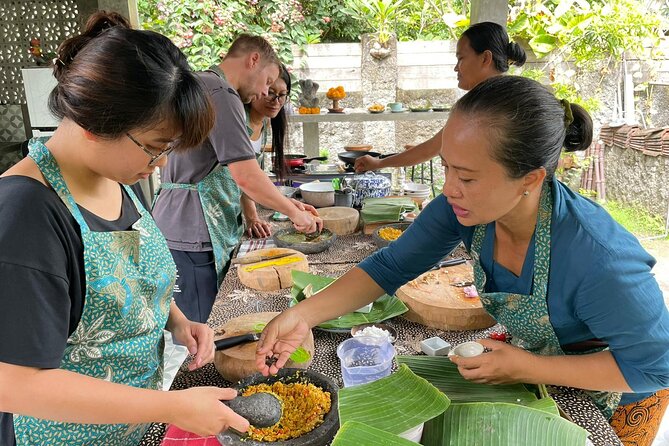
- Tempeh making is a revered tradition in Balinese cuisine, symbolizing prosperity and togetherness.
- Learning traditional Indonesian dishes offers a cultural and historical culinary immersion.
- Tempeh’s rich history and nutritional value make it a staple in Indonesian and global cuisine.
- Exploring Indonesian spice varieties enhances the flavor profiles and complexity of Balinese dishes.
It's also worth checking out some other tours and experiences nearby.
Significance of Tempeh in Balinese Cuisine
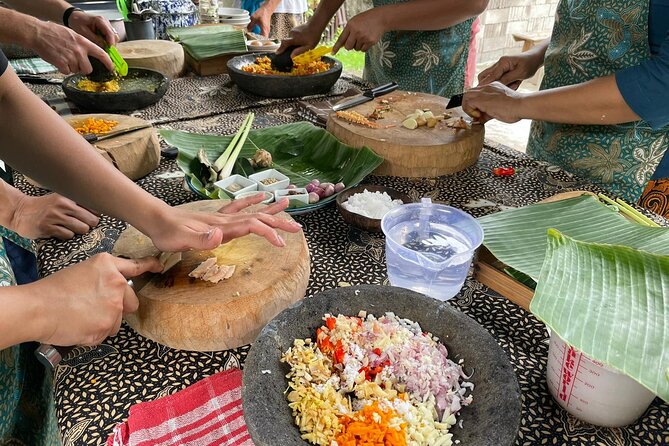
Tempeh holds a revered status in Balinese cuisine, playing a pivotal role in traditional dishes and showcasing the rich culinary heritage of the Indonesian island.
The production of tempeh involves fermenting soybeans, which are then pressed into a firm cake-like form. This process not only enhances the nutritional value of soybeans but also creates a unique texture and flavor profile.
Beyond its nutritional benefits, tempeh carries significant cultural significance in Balinese cuisine. It’s often used in ceremonies and celebrations, symbolizing prosperity and togetherness.
The versatile nature of tempeh allows it to be incorporated into various dishes, offering a delightful umami flavor and a satisfying meaty texture, making it a staple in Balinese cooking.
You can also read our reviews of more tours and experiences in Seminyak.
Learning Traditional Indonesian Dishes
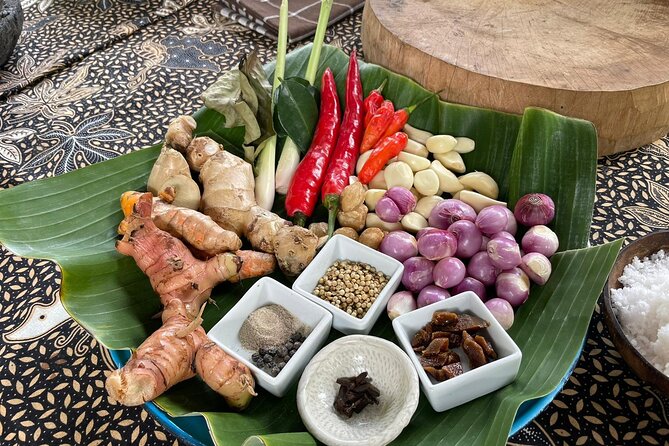
Set out on a culinary journey through the vibrant flavors of Indonesia by delving into the art of preparing traditional dishes deeply rooted in the country’s rich culinary heritage.
By learning traditional techniques, participants can enjoy the authentic flavors and cooking methods of Indonesia. These cooking experiences offer more than just recipes; they provide culture, giving insight into the historical significance of each dish.
From mastering the use of various spices to understanding the balance of flavors unique to Indonesian cuisine, participants are guided through a hands-on learning process that showcases the intricacies of crafting these traditional delicacies.
Through these classes, you can gain a deeper appreciation for the culinary traditions that have been passed down through generations in Indonesia.
History and Origins of Tempeh
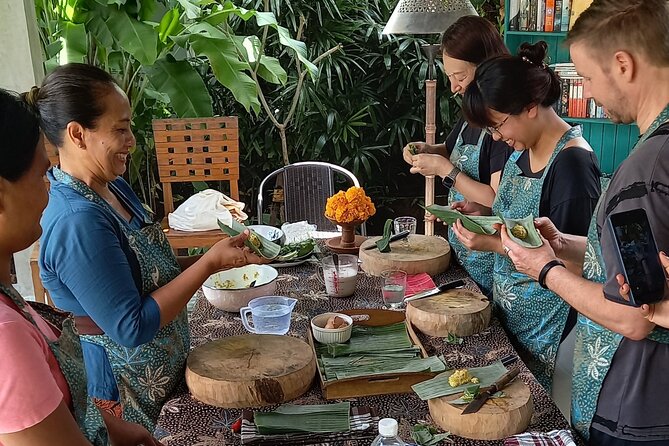
Venturing into the historical roots of tempeh unveils a fascinating journey that intertwines with the culinary tapestry of Indonesia.
-
Tempeh Fermentation:
Tempeh has a long history in Indonesian culture, dating back hundreds of years. This traditional food is made by fermenting soybeans, which are then pressed into a compact cake-like form. -
Nutritional Benefits:
Tempeh isn’t only a versatile ingredient but also a powerhouse of nutrients. Packed with protein, fiber, and probiotics, tempeh is a popular choice for those seeking a healthy and balanced diet. -
Culinary Evolution:
Over time, tempeh has evolved from a humble staple to a celebrated dish worldwide. Its unique taste and texture have made it a favorite among vegetarians and foodies looking for a nutritious and delicious option.
Exploring Indonesian Spice Varieties
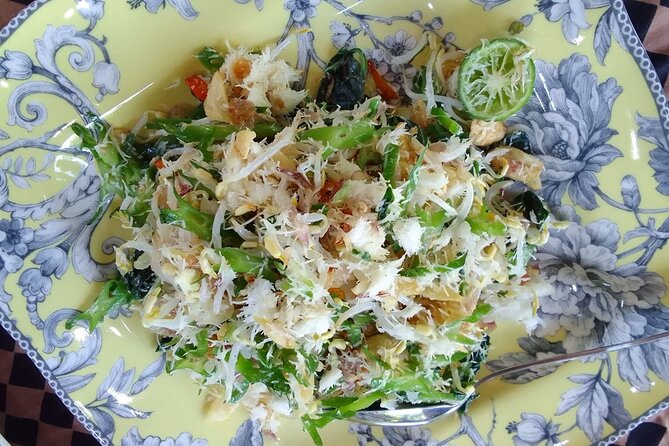
Indonesian cuisine offers a vibrant array of spice varieties that add depth and complexity to traditional dishes, enhancing the flavors and aromas of each culinary creation. Spice exploration in Indonesian cooking unveils a treasure trove of flavor profiles, from the fiery heat of sambal chili paste to the warm earthiness of ground coriander.
Key spices like lemongrass, galangal, and turmeric infuse dishes with their distinct fragrances, while kaffir lime leaves and Indonesian bay leaves provide subtle citrusy and herbal notes. Balinese cuisine, in particular, uses a unique blend of spices known as ‘bumbu’, which often includes shallots, garlic, and candlenuts for a rich, aromatic base.
Understanding and experimenting with these Indonesian spice varieties can elevate your culinary skills and transport your taste buds to the vibrant streets of Indonesia.
Personalized Cooking Classes Available
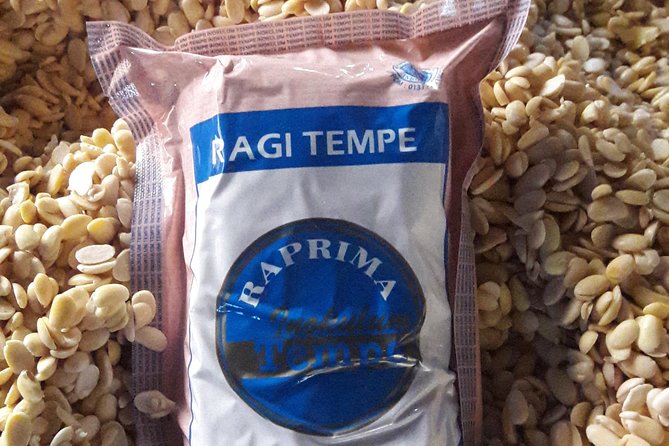
Exploring the vibrant array of Indonesian spice varieties has paved the way for personalized cooking classes that offer a hands-on experience in mastering the art of Balinese cuisine. Visitors can enjoy a culinary adventure where they learn the secrets of crafting authentic Balinese dishes from experienced local chefs.
These personalized classes ensure that participants receive individual attention and guidance throughout the cooking process, enhancing their understanding of traditional cooking techniques and ingredient combinations. By participating in these hands-on experiences, guests not only deepen their appreciation for Balinese flavors but also gain practical skills that they can replicate in their own kitchens.
Sample Menu With Balinese Flavors
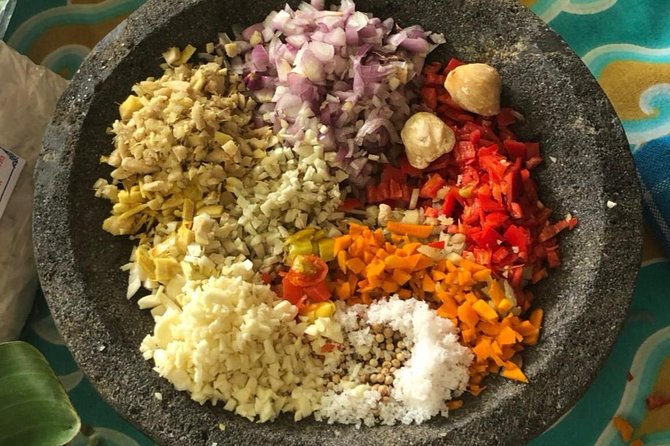
Enjoy a culinary journey that tantalizes your taste buds with an exquisite sample menu featuring vibrant Balinese flavors. The menu below showcases traditional Balinese dishes infused with the rich essence of tempeh and prepared using authentic Balinese cooking techniques.
| Sample Menu | Description | Ingredients |
|---|---|---|
| Tempeh Satay | Skewered tempeh marinated in Balinese spices | Tempeh, soy sauce, garlic, shallots, lemongrass, turmeric |
| Nasi Campur | A mixed rice dish with tempeh, vegetables, and sambal | Rice, tempeh, mixed vegetables, sambal sauce, fried shallots |
| Tempeh Sambal Matah | Tempeh stir-fried with Balinese sambal matah | Tempeh, lemongrass, kaffir lime leaves, chili, shallots |
Practical Details for Booking and Information
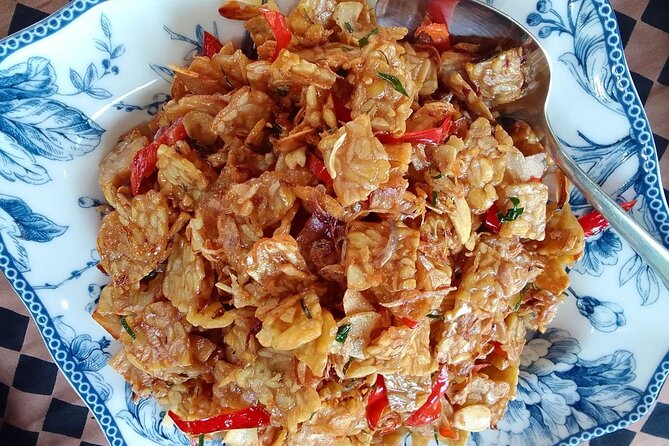
For those interested in booking the Tempeh Making and Cooking Balinese Dishes experience, practical details are available to ensure a smooth and enjoyable process from start to finish.
-
Booking Process: To secure a spot, travelers can visit the official website or contact Ayu and Ngurah directly.
-
Traveler Photos: Participants are encouraged to take photos throughout the experience to capture the culinary journey and share it with friends and family.
-
Information Assistance: For any inquiries or assistance regarding the booking process, you can reach out to the operators for prompt and helpful responses.
Here's a few more nearby tours and experiences we think you'll like.
Common questions
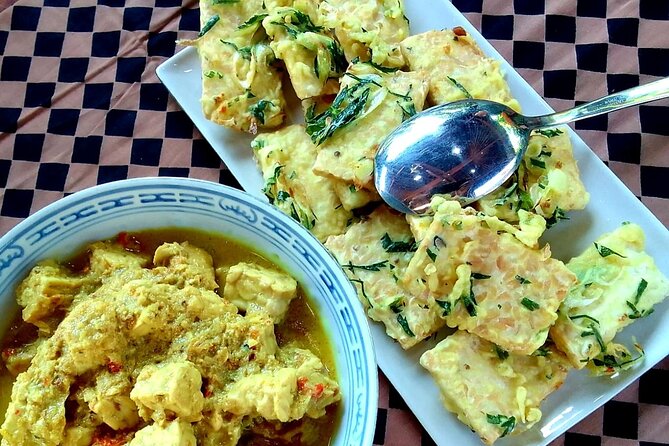
Can Participants With Dietary Restrictions or Allergies Be Accommodated During the Cooking Class?
Yes, participants with dietary restrictions or allergies can be accommodated during the cooking class. The instructors offer substitutions and alternatives to ensure everyone can fully participate and enjoy the experience without any concerns about their dietary needs.
Are There Any Recommended Souvenirs or Local Products Related to Tempeh That Can Be Purchased After the Class?
Local markets offer a range of tempeh-related souvenirs like handmade tempeh molds or spices used in Balinese cooking. Explore unique finds reflecting traditional cooking techniques. Consider dietary accommodations when selecting products.
Is There a Possibility to Visit a Local Market or Farm to Learn More About the Ingredients Used in Balinese Cuisine?
Visitors can enjoy a culture experience through a local market or farm visit, delving into Balinese cuisine’s ingredient exploration. Engage in the vibrant sights and scents, gaining insights into the rich culinary traditions of the region.
How Long Does the Tempeh-Making Process Typically Take During the Cooking Class?
The tempeh-making process typically takes around 24 to 48 hours during the cooking class. Utilizing traditional methods, the fermentation of tempeh requires patience and skill. Various recipe variations may impact the cooking time, offering a diverse culinary experience.
Are There Any Additional Cooking Techniques or Tips Shared During the Class Beyond the Specific Dishes Mentioned in the Sample Menu?
During the class, participants learn additional techniques and cooking tips beyond the sample menu. They uncover tempeh making secrets, explore various cooking techniques, and explore the intricacies of Authentic Balinese cuisine for a comprehensive culinary experience.
Not for you? Here's more of our most recent tour reviews happening neaby
- Leather Craft Workshop in Bali – 6 Hours
- Bali Ngurah Rai International Airport Pickup to Ubud Area
- Private Half-Day Tour : Ubud Waterfall Tour With Lunch Packages
- Private Ubud Monkey Forest Rice Terrace and Hidden Waterfall Tour
- North and West Bali Private Transport-Only Tour – Ubud
- Bali Water Sport and ATV Ride Packages : Best Quad Bike Trip
- Full-Day Ubud Private Tour
- Amazing Blue Lagoon Snorkeling With Private Hotel Transfer
- Taro Half-Day Private Village Experience With Hindu Blessing – Seminyak
- Private Experience Surf Lessons in Canggu
- Lempuyang Luhur Temple Gate Of Heaven Tour Car Charter
- Blue Lagoon Snorkeling And Sea Side Lunch All Inclusive
- Ubud Full Day Tour
- Bali Airport Transfer Service
- Lempuyang Temple Ticket Admission All Inclusive
Sum Up
Experience the magic of Balinese cuisine with our tempeh making and cooking classes. Dive into the rich history and flavors of Indonesian gastronomy while learning authentic techniques from Ayu and Ngurah.
Enjoy the vibrant world of Balinese spices and dishes, creating unforgettable culinary memories. Book your personalized cooking session now and elevate your skills with this hands-on adventure into the heart of Indonesian flavors.
Don’t miss out on this unique opportunity to explore the culinary delights of Bali!
More Cooking Classes in Seminyak
- Tempeh Making and Cooking Authentic Balinese Dishes
- Balinese Cooking Class & Tanah Lot Temple Visit – Private & All-Inclusive
- Bali Private Tour With Cooking Class, Monkey Forest and Pickup – Seminyak
- Nia Bali Seminyak Cooking Class
- Balinese Cooking Class in Seminyak
- Cooking Class in the Comfort of Your Own Personal Villa. Yes, Ill Come to You!
More Tour Reviews in Seminyak
- Leather Craft Workshop in Bali – 6 Hours
- Bali Ngurah Rai International Airport Pickup to Ubud Area
- Private Half-Day Tour : Ubud Waterfall Tour With Lunch Packages
- Private Ubud Monkey Forest Rice Terrace and Hidden Waterfall Tour
- North and West Bali Private Transport-Only Tour – Ubud
- Bali Water Sport and ATV Ride Packages : Best Quad Bike Trip
Not for you? Here's more nearby things to do in Seminyak we have reviewed
- Leather Craft Workshop in Bali – 6 Hours
- Bali Ngurah Rai International Airport Pickup to Ubud Area
- Private Half-Day Tour : Ubud Waterfall Tour With Lunch Packages
- Private Ubud Monkey Forest Rice Terrace and Hidden Waterfall Tour
- North and West Bali Private Transport-Only Tour – Ubud
- Bali Water Sport and ATV Ride Packages : Best Quad Bike Trip
- Full-Day Ubud Private Tour
- Amazing Blue Lagoon Snorkeling With Private Hotel Transfer
- Taro Half-Day Private Village Experience With Hindu Blessing – Seminyak
- Private Experience Surf Lessons in Canggu
- Lempuyang Luhur Temple Gate Of Heaven Tour Car Charter
- Blue Lagoon Snorkeling And Sea Side Lunch All Inclusive
